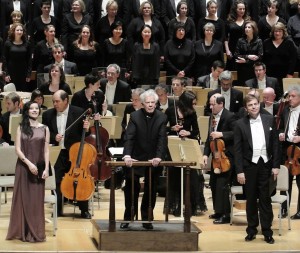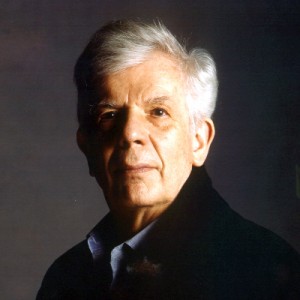Concert Review: Boston Symphony Orchestra/Christoph von Dohnányi at Symphony Hall
If a few of his tempos, particularly in the opening movement, weren’t among the liveliest on record, there was a gravitas and underlying conviction to Mr. von Dohnányi’s interpretation of A German Requiem that were wholly appropriate to the piece and its appearance on a program that was presented during Holy Week.
Ein deutsches Requiem (A German Requiem) by Johannes Brahms. Performed by the Boston Symphony and the Tanglewood Festival Chorus. At Symphony Hall, Boston, MA.
By Jonathan Blumhofer.

Christoph von Dohnányi and soloists Anna Prohaska and Hanno Müller-Brachmann following the BSO performance of Brahms's EIN DEUTSCHES REQUIEM at Symphony Hall. Photo: Stu Rosner
“There are some experiences in life which should not be required twice of any man,” George Bernard Shaw once quipped. “And one of them is listening to the Brahms Requiem.” Of course, such an observation from the author of The Perfect Wagnerite should be taken with a grain or two of salt: in one of the biggest cultural battles of the nineteenth century, Shaw took the side diametrically opposed, aesthetically, to Brahms’s classical restraint. Still, if you’ve ever sat through a sub-par reading of the Requiem (or one of its movements), you might find yourself in some measure of agreement with his sentiment.
Happily, the Boston Symphony Orchestra’s (BSO) latest outing of Ein deutsches Requiem, the sole piece on this weekend’s subscription concerts, reinforced what many of us already know: that experiencing a good performance of the Requiem is not a bad thing at all (and that listening to it more than once isn’t necessarily undesirable). Christoph von Dohnányi conducted the orchestra, Tanglewood Festival Chorus (TFC), and soloists Anna Prohaska and Hanno Müller-Brachmann in a probing, stately account of this famous score.
Brahms composed the first six movements of Ein deutsches Requiem in 1866, adding a seventh (“Ihr habt nur Traurigkeit”) in 1868. From the beginning, the Requiem has offered great comfort to many in times of need, regardless of ecclesiastical affiliation, a fact of which Brahms himself was fully aware: he once commented that the piece could be called “A Human Requiem,” the “German” of its title simply referring to the language in which it is written.
Indeed, the Requiem can—in its best performances—possess a sense of spiritual integrity that is unique to music of any genre or style. It follows that some of the piece’s finest interpreters have been individuals of high musical integrity, as well. Mr. von Dohnányi is certainly a musician who can command both musical and moral authority, and he brought out some great moments from his singers and players during Friday’s performance. If a few of his tempos, particularly in the opening movement, weren’t among the liveliest on record, there was a gravitas and underlying conviction to Mr. von Dohnányi’s interpretation that were wholly appropriate to the piece and its appearance on a program that was presented during Holy Week.
At the heart of the Requiem is Brahms’s choral writing and, after the debacle of Kurt Masur’s Missa solemnis cancellation in February, it was refreshing to hear the TFC performing at full strength under a conductor with whom they had long been scheduled to appear. A few small intonation discrepancies notwithstanding, Friday’s performance was about as fine a realization of this German text as one will hear from an American chorus, featuring a combination of musical sensitivity and excellent diction that was a pleasure to behold. Mr. von Dohnányi brought out a tremendous range of expression from the TFC, from the earth shaking (in the great third and sixth movement fugues) to some of the softest, most intimate pianissimo singing heard all season (occurring in one of the most magical moments in the opening movement). The well-known fourth movement (“Wie lieblich sind deine Wohnungen”) flowed along at a natural pace, while the thematic transformations of the finale (“Selig sind die Toten”) unfolded with a powerful sense of inevitability.
The vocal glories didn’t belong to the TFC alone: Ms. Prohaska and Mr. Müller-Brachmann proved themselves well cast in Brahms’s solo writing. Making her BSO debut, Ms. Prohaska, who possesses a strikingly clear tone, made the most of her brief, single movement (“Ihr habt nur Traurigkeit”), shaping Brahms’s melodic lines with pleasing sweetness. Mr. Müller-Brachmann, whose voice recalls the great Thomas Quasthoff, gave a noble account of his extended solos. Primarily an opera singer, some of his mannerisms were distracting—half-crouching and contorting himself as though realizing a stage role—though they didn’t detract from his singing: it was full-bodied, warm, and rounded throughout his third and sixth movement solos.
And the BSO, renowned for its affinity for French music, impressively channeled their inner Teutons with a thick, weighty, bass sound that was reinforced by James David Christie’s nuanced realization of Brahms’s organ writing. In the slow opening movement, there was a creamy richness to the musical texture, the strings (sans violins) radiating warmth and resignation, echoed by the gentle ripplings of the harps at movement’s end—the aural equivalent of watching the sun setting over a peaceful landscape. This lushness of texture remained a key component of the BSO’s sound in even the faster movements, though it never translated (as it sometimes can) into slushy, indistinct playing. Mr. von Dohnányi elected to seat the violins antiphonally, which helped clarify the complex sound of the score’s many contrapuntal textures.
It is always a pleasure to see Mr. von Dohnányi on the podium at Symphony Hall. Now aged 82, he still cuts an energetic profile, as was especially apparent in the fugal passages in the Requiem’s second, third, and sixth movements. Friday’s performance, which featured a pause between the fifth and sixth movements but no intermission, clocked in at around 70 minutes.
Tagged: A German Requiem, Anna Prohaska, BSO, Boston Symphony Orchestra, Christoph von Dohnányi, Hanno Müller-Brachmann


